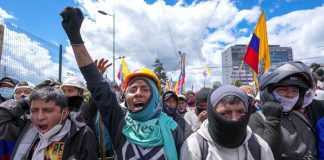Over the weekend of November 8 and 9, the Socialist Party of Malaysia (PSM) hosted “Socialism 2008” in Kajang, a rapidly growing working class town near Kuala Lumpur.
The conference brought together around 500 activists from across Malaysia, with others from Thailand, The Philippines, Singapore, Sri Lanka, Pakistan, Taiwan, Australia, Britain and Sweden.
This year has been momentous for the PSM. In the March general elections, they ran as socialists under the umbrella of the Anwar led opposition, and had both a federal and a state MP elected—putting the first socialists in the Malaysian parliament for some 40 years.
On the opening night we celebrated the anniversary of the Russian Revolution. Various speakers including PSM chairperson Nasir Hashim referred to the global financial crisis and the need for socialists to put forward our alternatives.
The first day of the conference saw sessions tackling the capitalist financial crisis; socialist solutions to climate change; and the Bolivarian Revolution in Venezuela.
In a session entitled, “South East Asia—People’s Power and Betrayals”, Giles Ji Ungpakorn from Turn Left in Thailand and Francisco Nemenzo from Laban ng Masa in the Philippines raised questions about contemporary politics in SE Asia which became recurring themes throughout the conference.
Giles raised the Thai People’s Alliance for Democracy which he now describes as fascist. He asked if the left had given up building its own party in Indonesia, in the wake of the unfortunate split in the Peoples Democratic Party (PRD). In relation to the Philippines, he asked whether the left can place any trust in a junior officers coup opposed to the government.
On the following morning, the newly elected MP for Sungai Siput and PSM central committee member, Dr Jeyakumar Devaraj, outlined the principles that inform their engagement with electoral politics and the increasing need for ideological clarity and party democracy.
One of the strengths of the PSM has been their long-standing commitment to building social movements to mobilise the most oppressed in Malaysian society, including plantation workers and slum dwellers. In 2002 they participated in JERIT, “network of oppressed peoples”, and in 2004 played a leading role in the Coalition Against the Privatisation of Health Care which engaged 82 different groups.
More recently they are active in a range of united fronts: fighting water privatisation; against the US-Malaysia Free Trade Agreement; and a courageous campaign to scrap the draconian Internal Security Act (ISA) that has seen bloggers imprisoned for more than 12 months for expressing political opinions online.
Electoral work
They feel that in Malaysia there has been a rehabilitation of left wing politics made possible by the arrogance of US imperialism, the efforts of veterans from the 1950s to retell their story and news from Latin America.
Dr Kumar outlined problems associated with being in parliament. He described an internal debate about whether he should stay at the YMCA when parliament was sitting or a five star hotel with other parliamentarians. It was decided that he should stay at the YMCA and give two thirds of his salary to the party.
He acknowledged that these decisions were largely symbolic but that they conveyed an important message—“we are different”.
There is a strong tradition of politicians behaving like Santa Claus and tossing some coins around their electorate. PSM argues such behaviour is an obstacle to serious organising. They want their parliamentarians to act as catalysts for organising, share office resources to help squatters—urban pioneers—fight against eviction and so on.
PSM secretary-general Arutchelvan spoke about the way to achieve the right balance between electoral and mass movement work, and how to strengthen the opposition whilst building the PSM’s independent profile. Crucially, he discussed the importance of strengthening the multi-ethnic membership of the PSM, in a country that has long been characterised by race-based parties.
Alongside the PSM’s impressive activism is a determination to popularise socialist history and theory. During the conference they proudly launched a Malay translation of Ian Birchall’s Lenin.
The PSM emphasise the importance of building international solidarity, across Asia and beyond, while arguing for the need for activists to build the struggle in our own countries. Next year, their Socialism 2009 will focus much more on local issues aimed at building the movements in Malaysia.
By Tim Erikson and Mark Goudkamp





